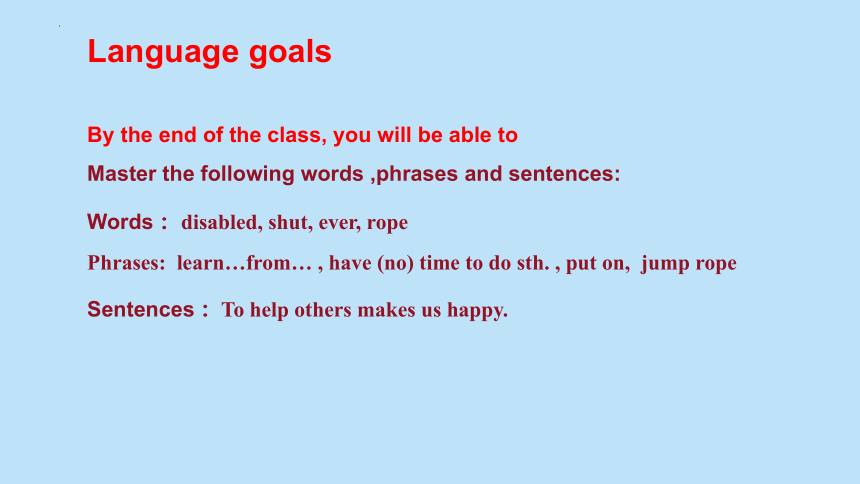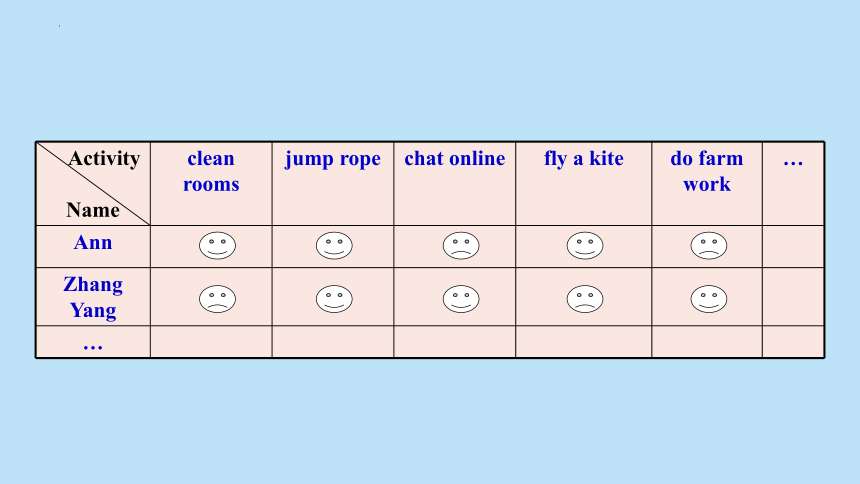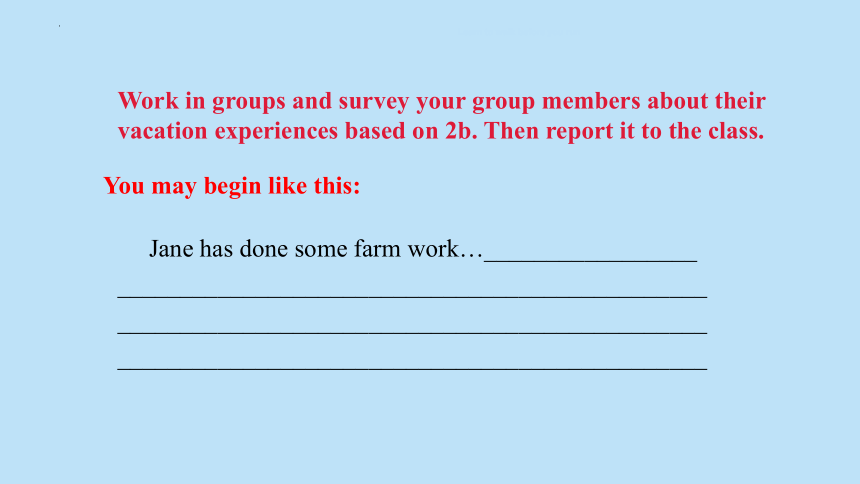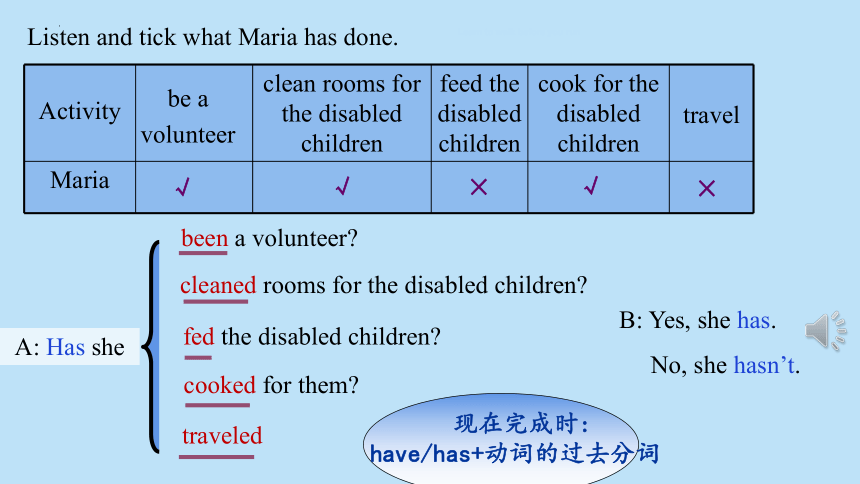Unit 1 The Changing World Topic 1 Section B 课件(共19张PPT) 仁爱科普版英语九年级上册
文档属性
| 名称 | Unit 1 The Changing World Topic 1 Section B 课件(共19张PPT) 仁爱科普版英语九年级上册 |

|
|
| 格式 | pptx | ||
| 文件大小 | 1.4MB | ||
| 资源类型 | 教案 | ||
| 版本资源 | 仁爱科普版 | ||
| 科目 | 英语 | ||
| 更新时间 | 2024-10-01 00:00:00 | ||
图片预览







文档简介
(共19张PPT)
仁爱版九年级英语上册
Unit 1 The Changing World Topic 1 Section B
Language goals
By the end of the class, you will be able to
Master the following words ,phrases and sentences:
Words: disabled, shut, ever, rope
Phrases: learn…from… , have (no) time to do sth. , put on, jump rope
Sentences: To help others makes us happy.
Did you clean rooms for the disabled children
你为残疾少年打扫过房间吗?
Did you feed them
你给他们喂饭吗?
No, I didn't. But I cooked for them.
不,我没有。但是我为他们做了饭菜。
Activity Name clean rooms jump rope chat online fly a kite do farm work …
Ann
Zhang Yang
…
Learn to walk before you run
Work in groups and survey your group members about their vacation experiences based on 2b. Then report it to the class.
Jane has done some farm work…_________________ _______________________________________________
______________________________________________________________________________________________
You may begin like this:
Learn to walk before you run
Listen and tick what Maria has done.
Activity clean rooms for the disabled children feed the disabled children cook for the disabled children
travel
Maria
√
A: Has she
B: Yes, she has.
No, she hasn’t.
cleaned rooms for the disabled children
动词的过去分词
Past Participle
√
×
√
×
been a volunteer
be a
volunteer
现在完成时:
have/has+动词的过去分词
fed the disabled children
cooked for them
traveled
Learn to walk before you run
What a wonderful experience!
多么美妙的经历啊!
I've learnt a lot from it. I think it makes me happy to help others.
我从那里学到了很多东西,我觉得帮助别人可以使我快乐。
learn ...from … 从……中学习
e.g. I’ve learnt a lot from the story.
我从这个故事中学到了很多。
Key points
Learn to walk before you run
① make sb. + 形容词(adj.)使某人..的
②make sb. + 动词原形(v.) 使某人做某事
③make sb. + 职业头衔名词(n.) 让某人做…职位
The music ______ me happy.
My mother ______ me ______(help) the others yesterday.
We _______ Xi Jinping our chairman.
Learn to walk before you run
Revision in class
1. 你的旅行如何? _________________
2. 发生 _________________
3. 曾去过……(去而复返) _________________
4. 如此……以至于…… _________________
5. 到……去了(去而未归)________________
6. 上课铃响了。 _________________
7. 从…回来 ____________________
8. 一个照相的好地方 _________________________
9. 提高英语 ___________________
10. 暑假玩得愉快 __________________________
11. 巨大的变化 ________________
12. 顺便提一下_________________
13. 好久不见____________________
How was your trip
take place
have/has been to
so … that …
have/has gone to
There goes the bell.
come back from
a good place to take photos
improve my English
have a good summer holiday
great changes
by the way
Long time no see.
Listen and mark T (True) or F (False).
1. Maria helped the disabled children to clean the rooms and fed them.
2. Maria thinks her experience as a volunteer was wonderful.
3. Maria felt very happy because she helped others.
4. Kangkang has been to a summer school to help the old.
5. Kangkang has made some new friends in the English summer school.
( )
( )
( )
( )
( )
F
T
T
F
T
Learn to walk before you run
How interesting! 多有趣啊
Have you ever been to other places 你曾经去别的其他地方吗?
No, I haven’t. Though I had no time to travel, I still felt very happy. What about you
没有去过。即使我没有时间去旅行,但我仍然觉得很快乐,你呢?
Learn to walk before you run
Read and complete the following passage.
Both Maria and Kangkang have done something meaningful. Maria has ____________ some volunteer activities to help some disabled _______. She ________________ a lot from it, and she said _____________ others made her happy. Kangkang __________ an English summer school. He _______ some new friends there, and they also ________ funny shows for a group of old people in a ___________.
taken part in
children
has learned/ learnt
has been to
to help/helping
made
put on
community
Learn to walk before you run
Key points
You took part in some volunteer activities during summer holidays, didn’t you
你在暑假参加了一些志愿者活动,是吗?
① 反意疑问句:由两部分构成,前一部分是对事物的陈述,后一部分是简略的问句。前者用肯定形式,后者一般用否定形式;反之亦然。
eg:
It’s a nice day, isn’t it
Ann didn’t use to live there, did she
Learn to walk before you run
have (no) time to do sth. 有(没有)时间做某事
e.g.他太忙了,没有时间吃午饭。
He was so busy that he had no time to have lunch.
Though I had no time to travel, I still felt very happy. 虽然我没有时间去旅行,但我仍然感到很开心。
though/although
even though/even if
e.g.虽然很晚了,但是工人们继续工作。
Though/Although it was very late, the workers
went on working.
虽然,尽管,即使
让步状语从句
通常不与but连用
Learn to walk before you run
② join, join in和 take part in,都可表示“参加”:
join多指参加某组织,成为其中的一个成员。
eg: You can join the English club to practice English.
你可以加入英语俱乐部练习英语。
join in 指参加某项比赛或活动,常用于口语。join sb. in (doing) sth.表示“与某人一起参加某种活动”
eg: I hope you'll all join in the discussion.我希望你们大家都参加讨论。
Would you join me in a walk 和我一起去散步好吗
take part in 指参加活动,有时可与join in互换。
eg: Students should take part in all kinds of activities after class.
学生们课后应该参加各种活动。
Learn to walk before you run
What a wonderful experience!
多么美妙的经历啊!
what引导的感叹句,what意为“多么;真;太”,用作定语修饰名词。
此处句式结构为:
what + a/an + 形容词 + 可数名词单数 + (主语+谓语)! 口语中常可以省略主语和谓语。
eg: What a new watch (it is)! 多么新的一块手表啊!
Learn to walk before you run
1. We should help the people when they are in trouble.
2. — It’s getting colder now. Would you please the door
— Sure.
3. He told me that he an English party last night.
4. We were busy at that time, so we had no time shopping.
5. is to believe.
takes part in
To see
to go
went
disabled
shut
Saw
took part in
disabled
shut
took part in
to go
To see
Learn to walk before you run
Summary
We learn
We can
1. Some words:
disabled, shut, ever, rope
2. Some phrases:
learn…from… , have (no) time to do sth. , put on,jump rope
1. Write the different forms of the verbs and pronounce them correctly.
jump—jumped— jumped
2. Use the Present Perfect Tense.
仁爱版九年级英语上册
Unit 1 The Changing World Topic 1 Section B
Language goals
By the end of the class, you will be able to
Master the following words ,phrases and sentences:
Words: disabled, shut, ever, rope
Phrases: learn…from… , have (no) time to do sth. , put on, jump rope
Sentences: To help others makes us happy.
Did you clean rooms for the disabled children
你为残疾少年打扫过房间吗?
Did you feed them
你给他们喂饭吗?
No, I didn't. But I cooked for them.
不,我没有。但是我为他们做了饭菜。
Activity Name clean rooms jump rope chat online fly a kite do farm work …
Ann
Zhang Yang
…
Learn to walk before you run
Work in groups and survey your group members about their vacation experiences based on 2b. Then report it to the class.
Jane has done some farm work…_________________ _______________________________________________
______________________________________________________________________________________________
You may begin like this:
Learn to walk before you run
Listen and tick what Maria has done.
Activity clean rooms for the disabled children feed the disabled children cook for the disabled children
travel
Maria
√
A: Has she
B: Yes, she has.
No, she hasn’t.
cleaned rooms for the disabled children
动词的过去分词
Past Participle
√
×
√
×
been a volunteer
be a
volunteer
现在完成时:
have/has+动词的过去分词
fed the disabled children
cooked for them
traveled
Learn to walk before you run
What a wonderful experience!
多么美妙的经历啊!
I've learnt a lot from it. I think it makes me happy to help others.
我从那里学到了很多东西,我觉得帮助别人可以使我快乐。
learn ...from … 从……中学习
e.g. I’ve learnt a lot from the story.
我从这个故事中学到了很多。
Key points
Learn to walk before you run
① make sb. + 形容词(adj.)使某人..的
②make sb. + 动词原形(v.) 使某人做某事
③make sb. + 职业头衔名词(n.) 让某人做…职位
The music ______ me happy.
My mother ______ me ______(help) the others yesterday.
We _______ Xi Jinping our chairman.
Learn to walk before you run
Revision in class
1. 你的旅行如何? _________________
2. 发生 _________________
3. 曾去过……(去而复返) _________________
4. 如此……以至于…… _________________
5. 到……去了(去而未归)________________
6. 上课铃响了。 _________________
7. 从…回来 ____________________
8. 一个照相的好地方 _________________________
9. 提高英语 ___________________
10. 暑假玩得愉快 __________________________
11. 巨大的变化 ________________
12. 顺便提一下_________________
13. 好久不见____________________
How was your trip
take place
have/has been to
so … that …
have/has gone to
There goes the bell.
come back from
a good place to take photos
improve my English
have a good summer holiday
great changes
by the way
Long time no see.
Listen and mark T (True) or F (False).
1. Maria helped the disabled children to clean the rooms and fed them.
2. Maria thinks her experience as a volunteer was wonderful.
3. Maria felt very happy because she helped others.
4. Kangkang has been to a summer school to help the old.
5. Kangkang has made some new friends in the English summer school.
( )
( )
( )
( )
( )
F
T
T
F
T
Learn to walk before you run
How interesting! 多有趣啊
Have you ever been to other places 你曾经去别的其他地方吗?
No, I haven’t. Though I had no time to travel, I still felt very happy. What about you
没有去过。即使我没有时间去旅行,但我仍然觉得很快乐,你呢?
Learn to walk before you run
Read and complete the following passage.
Both Maria and Kangkang have done something meaningful. Maria has ____________ some volunteer activities to help some disabled _______. She ________________ a lot from it, and she said _____________ others made her happy. Kangkang __________ an English summer school. He _______ some new friends there, and they also ________ funny shows for a group of old people in a ___________.
taken part in
children
has learned/ learnt
has been to
to help/helping
made
put on
community
Learn to walk before you run
Key points
You took part in some volunteer activities during summer holidays, didn’t you
你在暑假参加了一些志愿者活动,是吗?
① 反意疑问句:由两部分构成,前一部分是对事物的陈述,后一部分是简略的问句。前者用肯定形式,后者一般用否定形式;反之亦然。
eg:
It’s a nice day, isn’t it
Ann didn’t use to live there, did she
Learn to walk before you run
have (no) time to do sth. 有(没有)时间做某事
e.g.他太忙了,没有时间吃午饭。
He was so busy that he had no time to have lunch.
Though I had no time to travel, I still felt very happy. 虽然我没有时间去旅行,但我仍然感到很开心。
though/although
even though/even if
e.g.虽然很晚了,但是工人们继续工作。
Though/Although it was very late, the workers
went on working.
虽然,尽管,即使
让步状语从句
通常不与but连用
Learn to walk before you run
② join, join in和 take part in,都可表示“参加”:
join多指参加某组织,成为其中的一个成员。
eg: You can join the English club to practice English.
你可以加入英语俱乐部练习英语。
join in 指参加某项比赛或活动,常用于口语。join sb. in (doing) sth.表示“与某人一起参加某种活动”
eg: I hope you'll all join in the discussion.我希望你们大家都参加讨论。
Would you join me in a walk 和我一起去散步好吗
take part in 指参加活动,有时可与join in互换。
eg: Students should take part in all kinds of activities after class.
学生们课后应该参加各种活动。
Learn to walk before you run
What a wonderful experience!
多么美妙的经历啊!
what引导的感叹句,what意为“多么;真;太”,用作定语修饰名词。
此处句式结构为:
what + a/an + 形容词 + 可数名词单数 + (主语+谓语)! 口语中常可以省略主语和谓语。
eg: What a new watch (it is)! 多么新的一块手表啊!
Learn to walk before you run
1. We should help the people when they are in trouble.
2. — It’s getting colder now. Would you please the door
— Sure.
3. He told me that he an English party last night.
4. We were busy at that time, so we had no time shopping.
5. is to believe.
takes part in
To see
to go
went
disabled
shut
Saw
took part in
disabled
shut
took part in
to go
To see
Learn to walk before you run
Summary
We learn
We can
1. Some words:
disabled, shut, ever, rope
2. Some phrases:
learn…from… , have (no) time to do sth. , put on,jump rope
1. Write the different forms of the verbs and pronounce them correctly.
jump—jumped— jumped
2. Use the Present Perfect Tense.
同课章节目录
- Unit 1 The Changing World
- Topic 1 Our country has developed rapidly.
- Topic 2 The population in developing countries is
- Topic 3 The world has changed for the better.
- Unit 2 Saving the earth.
- Topic 1 Pollution has causes too many problems.
- Topic 2 All these problems are very serious.
- Topic 3 What can we do to protect the environment
- Unit 3 English around the World
- Topic 1 English is widely spoken around the world.
- Topic 2 Some things usually have different meaning
- Topic 3 Could you give us some advice on how to l
- Unit 4 Amazing Science
- Topic 1 When was it invented?
- Topic 2 I'm excited about the things that will be
- Topic 3 China is the third nation that sent a pers
